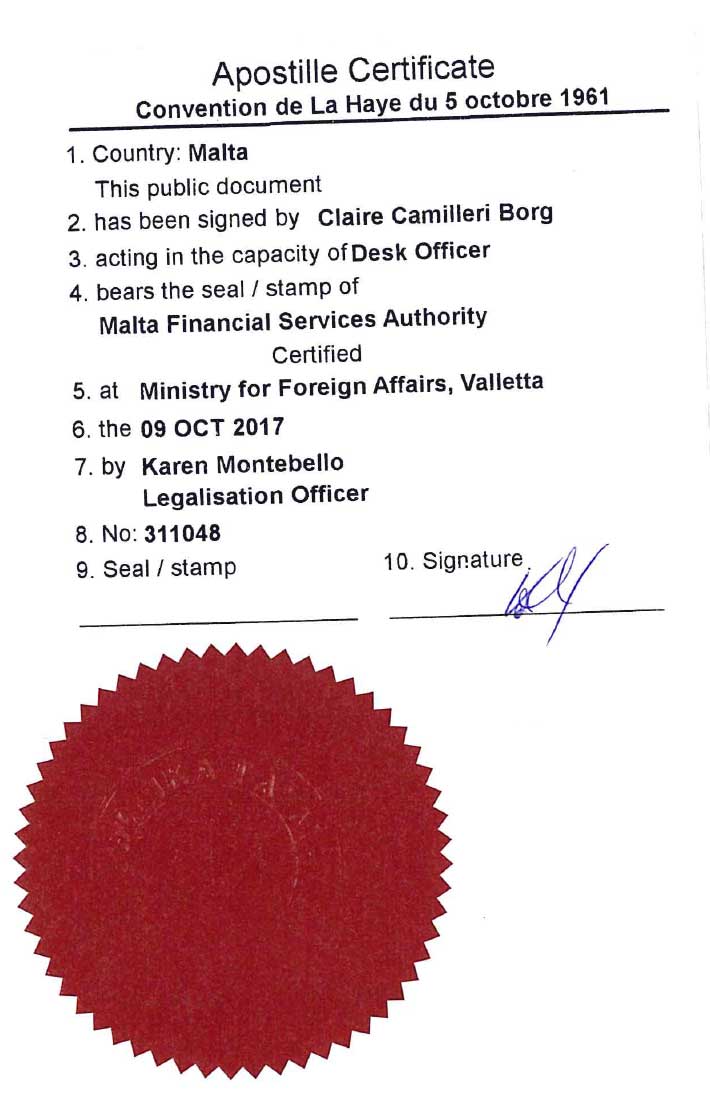
Schmidt & Schmidt covers the full spectrum of legalization services for documents issued in Malta.
Malta joined the Hague Convention on the Simplified Authentication of Documents on 12 June 1967; the Convention entered into force on 3 March 1968.
The apostille, or the “Hague apostille” is a certificate that authenticates the origin of a public document (e.g., a birth, marriage or death certificate, a judgment, an extract of a register or a notarial attestation). It confirms the authenticity of the signature and the authority of an official who signed the public document.
Documents issued in Malta are certified with an apostille in accordance with the Hague Convention of 1961 are recognized in all Member States of the Hague Convention and do not require any other form of certification, such as consular legalization, which considerably reduces the costs and time required for the certification of documents. So far, more than 120 states have joined the Convention.
The apostille is not sufficient for use in the states that are not party to the Hague Convention. In this case, consular legalization applies to a public document.
Designated Competent Apostille Authorities in Malta
The designated Competent Authority in Malta entrusted with the issuance of apostilles is the Ministry of Foreign Affairs.
To facilitate the apostille process, the following fee structure applies in Malta:
- Commercial documents: EUR 20
- Non-commercial documents: EUR 12
This streamlined procedure not only benefits individuals seeking to authenticate their documents for international use but also underscores Malta's commitment to efficient cross-border document recognition in accordance with international standards.
The apostille in Malta is a square stamp in Maltese with the obligatory heading "Apostille" and a reference to the 1961 Hague Convention in French (Convention de La Haye du 5 octobre 1961). The apostille certificate’s sides will be at least 9 centimeters long.
Types of documents

| Can be apostillized | Cannot be apostillized |
|---|---|
|
|
Specific aspects and document requirements for the apostille in Malta
The apostille process can vary depending on the sender and recipient country, but typically to obtain an apostille for a document in Malta, you must go through the following steps:
- Obtaining the original document to be apostilled;
- Verification of the signature on the document by the authorized body;
- Issuance of an apostille on a document by an authorized body;
- Submission of the document together with the apostille in the recipient country.
This process can be time-consuming, especially if it includes multiple documents and different countries. To ensure a smooth and accurate apostille process, it is recommended to seek guidance from specialists familiar with the requirements and procedures. Their expertise can help avoid delays and errors in obtaining documents apostille.
Document requirements that might apply:
- The document must be an original or a certified copy issued by the competent authority.
- The document should contain all relevant and accurate information.
- The document must be in the official language of the issuing country or translated into the official language of the country where the apostille is sought.
- The apostille must be affixed by the designated competent authority in accordance with regulations.
For the purpose of legalization or apostille, commercial documents must be submitted with the original copy, which should bear the signature and stamp of an MFSA (Malta Financial Services Authority) official who is registered with MFET (Malta Financial Services Authority Register of Officials). Business documents, on the other hand, are eligible for legalization or apostille if they are first notarized by a qualified legal practitioner, a certified public accountant, or an auditor who is registered with MFET.
The apostille is issued in a uniform format. In Malta, it has the form of a printed sticker with a handwritten signature of an official, an official seal, and a hologram.
In cases where apostilles are not recognized, holders of foreign documents will need to legalize them instead. However, If the country of destination of the document recognizes and issues apostilles, then legalization is unnecessary.
Legalization of Malta educational documents for use abroad
The process of legalizing educational documents in Malta involves submitting them to the designated authority along with the required fee. Once the apostille is affixed to your documents, it serves as an internationally recognized endorsement of their authenticity. This is particularly important when presenting your educational credentials to foreign institutions, employers, or authorities.
By undergoing the apostille process, your Malta educational documents gain credibility and acceptance across borders. This ensures that your academic achievements are acknowledged and respected in foreign countries, contributing to your opportunities for further education, employment, and professional growth on an international scale.
Recognition of the authenticity of public documents within the EU
Documents from countries with which Malta has bilateral agreements for exemption from legalization are not required to undergo any form of legalization procedures.
Regulation on public documents (EU) 2016/1191 of 6 July 2016
Furthermore, Regulation (EU) 2016/1191 of 6 July 2016 on public documents simplifies the circulation of certain public documents that must be presented in an EU Member State and have been issued in another EU Member State, thus exempting public documents from the confirmation of authenticity with the Apostille with the aim of reducing administrative burden and costs for citizens.
Consular legalization of Malta documents for use abroad
Consular legalization is the process of authenticating or certifying a legal document so a foreign country's legal system will recognize it as with full legal effect that is carried out by the diplomatic or consular mission of the country in which the document is to be used.
Consular legalization is more complex, time-consuming and costly than the simpler apostille procedure. Whereas apostille is usually issued within one step, consular legalization requires several pre-certifications before a public document can be certified at the embassy or consulate of the destination country.
It is a common requirement that the document has to be translated into the official language of the destination country before submission to the embassy. It is up to the diplomatic mission to decide about the authentication procedure.
The main differences between an apostille and consular legalization of documents
The common feature between apostille and consular legalization is that they authenticate an official document for presentation to institutions in another country. However, they have many differences.
| Apostille | Consular legalization | |
|---|---|---|
| Legal effect | Can be used in all countries that are party to the Hague Convention on the Simplified Legalization of Documents. | Use between States one or both of which is not a member of the Hague Convention, or where one of the contracting States has protested the accession of the other. |
| Difficulty | Moderate. To obtain an apostille, contact the competent apostille authority of the state of origin of the document. | High. For consular legalization, various inland authorities and a diplomatic mission of the state of destination must be involved. |
| Pre-certification | Usually not required. | Is obligatory. |
| Attestation at the state of destination embassy in the state of origin of the document | No need to contact the Consulate of the country of destination. | Is the final step of legalization. |
Apostille and consular legalization in all cities of Malta
Schmidt & Schmidt provides apostille and consular legalization services for public documents originating from all regions across Malta. We handle the entire process, from document review to obtaining the necessary certifications, ensuring that your documents are valid and recognized internationally. With our reliable services, you can confidently use your Malta public documents abroad.
Procurement of documents from Malta
If the important documents are lost or damaged, or current copies of the documents are needed, the re-issue of the documents is required. It is not unusual for people outside Malta to encounter difficulties with obtaining new documents when abroad. Our consultants will help you procure new documents from Malta remotely, and we can arrange for your documents to be sent by courier anywhere in the world.
Certified translation of documents from Malta
Copies and transcripts of civil status documents can be translated into any language by a sworn translator in Malta or the translation can be done in the country of destination. We offer certified translations of civil status documents with further certification. The cost of the work is calculated according to the volume of the document in question.
Does the translation have to be apostillized?
Any foreign document issued in one country and used in another country must be legalized for use abroad. Therefore, the authenticity of a certified translation from Malta needs to be certified by an apostille. Consequently, many authorities may not accept certified translations from Malta if the translation has not been properly authenticated in Malta for use abroad. To avoid this confusion, translations should better be made in the state of the destination of the document.

























































